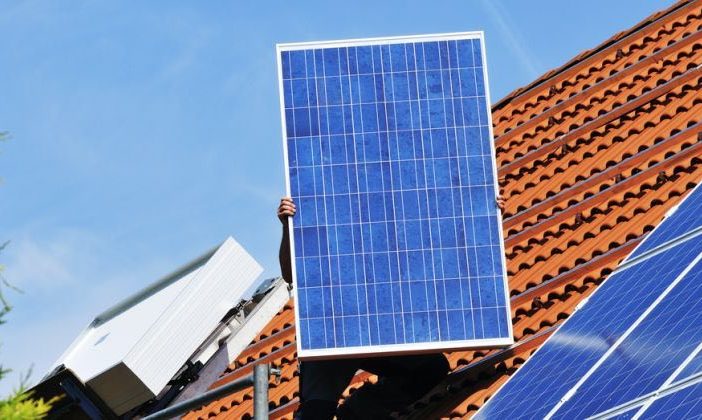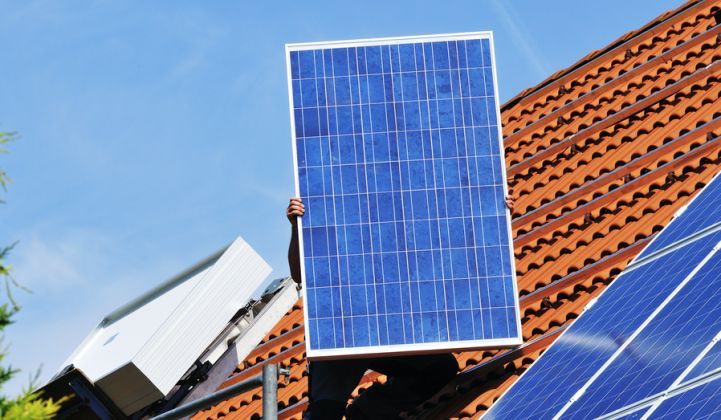
A pre-Christmas message from federal energy minister Angus Taylor warning that Australia’s booming rooftop solar market was risking people’s lives has earned a swift rebuke – and a cursory fact check – from the Clean Energy Council.
Taylor – never one to miss a “pink batts” moment – this week wrote to state energy ministers to share his concerns over a Clean Energy Regulator audit that found 21-26 per cent of rooftop solar installations inspected every year since 2011 had faulty wiring and unsecured panels.

According to Murdoch paper The Australian, which duly reported the “exclusive” story on its front page under the headline Warning of deaths over solar panels, some of these faulty installs – a little under 3 per cent – “posed a ‘severe risk’” where wiring was exposed.
“I’ve written to every state and territory minster highlighting the severity of the issue … we want to make sure safety comes first,” Taylor told The Australian. “This is a rapidly growing industry and we can’t risk people’s lives.”
Taylor even tried to get the subject onto the agenda of Wednesday’s COAG Energy Council meeting, with the paper reporting “state and territory energy minsters refused” the suggestion.
Like the ministers, CEC chief Kane Thornton was keen to put the issue in perspective, noting that the solar industry was one of the safest and most heavily regulated areas of electrical safety in the country.
“More than 2 million Australian homes have now installed solar, and the majority of these systems are performing well and up to expectations,” Thornton said in comments on Thursday.
“Obviously no industry is perfect, but the percentage of unsafe systems has declined this decade from 4.2 per cent to 2.7 per cent. This is better than the electrical industry as a whole.
“The audit report noting that a single element that is not completely up to scratch does not mean a system is unsafe,” he added.
“We will use the report – as we do with similar reports from the Clean Energy Regulator which are published every year – to further improve standards and compliance across the industry.”
Thornton also noted that while safety is indeed overseen by separate state electrical safety bodies, his organisation has long lobbied for a single national body to ensure greater consistency of approach including improved resourcing and consistent inspection programs.
“The report did note the need to improve workplace health and safety for the installation of solar, something we are working on with numerous government agencies,” he said.
In the meantime, Thornton added, consumers installing solar were encouraged to use on the CEC’s Approved Solar Retailers, and to make sure the installer on their roof was a professional, and accredited with the CEC – all accredited solar installers have a photo ID card.
“Approved Solar Retailers have committed to ethical marketing practices, excellence in customer service and a minimum five-year whole of system warranty,” he said.
“Just like servicing your car, we also encourage people to have their solar power system serviced by an accredited professional every couple of years.”

It is worth noting at this point that, as Thornton himself concedes, the rooftop solar industry is not perfect – as is frequently highlighted in our Solar Insiders podcast series, and is the raison d’être of the popular Facebook group Crap Solar (see image above).
Indeed, concerns about safe industry practice and the incidence of “dodgy” retailers and installers have been heightened with the launch of various government subsidy programs, and particularly in the case of the Victorian government’s $1.2 billion Solar Home rebate.
But this issue has not been ignored.
Solar Victoria, the Latrobe Valley-based government agency tasked with rolling out of the scheme, has consistently warned consumers to be wary of “scammers and inaccurate marketing” by rooftop PV cowboys pushing dodgy products and trying to cash in on the scheme.
And in October, it enlisted the help of Consumer Affairs Victoria, Work Safe and others, as part of a taskforce to help combat high-pressure sales tactics, inaccurate marketing and poor service.
For good measure, here are some of the recommendations from Solar Victoria COO Jonathan Leake, on how to avoid installing faulty PV systems:
– Don’t go through cold-callers or door-knockers;
– Query advertising claims: if the price seems too good to be true, then it probably is;
– Don’t provide bank details over the phone or at the door;
– Resist pressure tactics: Unscrupulous operators may try to pressure you into buying solar PV panels by claiming rebates are running out or offer a special deal that seems too good to be true;
– Solar PV should hold the appropriate electrical licence for each state and be accredited by the Clean Energy Council (CEC) Solar Accreditation Scheme.
– Installers must demonstrate and adhere to safe working procedures, have a good safety record and comply with occupational health and safety and electrical safety laws.
– Installers need to provide a statement that they have had no prosecutions registered with WorkSafe Victoria in the past three years (or with any equivalent authority in another Australian jurisdiction).
You can also learn more about buying a solar installation in the guides produced by Consumer Affairs Victoria, and the Clean Energy Council.
Merry Christmas!

Sophie is editor of One Step Off The Grid and deputy editor of its sister site, Renew Economy. Sophie has been writing about clean energy for more than a decade.

